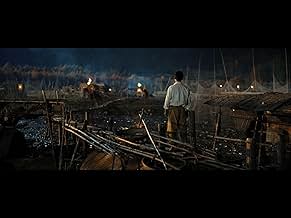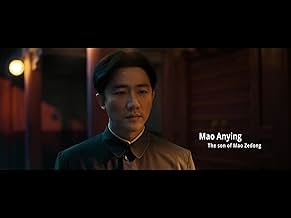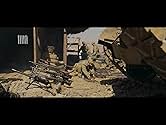PUNTUACIÓN EN IMDb
5,5/10
4,6 mil
TU PUNTUACIÓN
Una batalla épica de hace 71 años, cuando el Ejército Popular de Voluntarios entró en Corea del Norte. En condiciones extremas de frío, las tropas en el frente oriental lucharon, con espírit... Leer todoUna batalla épica de hace 71 años, cuando el Ejército Popular de Voluntarios entró en Corea del Norte. En condiciones extremas de frío, las tropas en el frente oriental lucharon, con espíritu intrépido y voluntad de hierro.Una batalla épica de hace 71 años, cuando el Ejército Popular de Voluntarios entró en Corea del Norte. En condiciones extremas de frío, las tropas en el frente oriental lucharon, con espíritu intrépido y voluntad de hierro.
- Premios
- 37 premios y 40 nominaciones en total
Reseñas destacadas
I looked through some of the comments of other people, including some who claimed to be history students. The history he studied may be just a profile.
First of all, it is really not a propaganda tool. I am sorry to say that the resistance of many Westerners to this movie. In real time, this is basically the real Chinese understanding of that period of history. Perhaps this reflects a huge difference in cognition.
Whether who won or lose, for the Chinese, that war is iconic. Before China was involved in the war, the Chinese government did repeatedly (15 times in my impression) not to cross the 38-degree line. However, no one listened to China's warnings. That's the in real history, and China have to engaged in the war which they did not want.
In the historical memory of the Chinese people, the general trend of the war is consistent with the movie. The mainstream view in China does not believe that China won the entire Korean War, but that China in that barren era achieved its strategic goals by virtue of its tenacious will.
And whether these characters are completely equivalent to the plot of the movie, we don't have to take it seriously. But for the Chinese, that war gave birth to many heroic deeds. These heroes and veterans will certainly magnify some facts in their memories, but they do represent the will of that era. But to a large extent, we can understand these plots as the Chinese collective memory of this period of history.
Friends who study history, if you really go to Afghanistan to see what happened there, you will find that they have their own historical memory. I think that in fact, no matter whether a country wins or loses, there are heroes. These countries and people should be given a chance to write their own heroes. In fact, many heroes may be just small people. Maybe they have gone through a certain period behind the flashlight. They are just the epitome of the times. If there were no movies and literary works, they might have been forgotten long ago.
What needs to be emphasized is that if you really understand China, China is very disgusted with war. China has experienced too many history and feelings that Westerners are not familiar with. On the contrary, China has great sympathy and empathy for countries and individuals who are in war or suffering.
Aside from this, the movie itself has a basic performance in addition to the mentally handicapped special effects, whether it is individual or as a whole.
Regarding the issue of actors, in fact, most people in China do not understand the meaning behind the expressions of foreigners, so they cannot judge the acting skills of Westerners, just like the Chinese faces in countless movies do not hinder Western judgments.
Maybe to you, the story of this movie is meaningless. But the story here does express others' understanding of the same period of history.
First of all, it is really not a propaganda tool. I am sorry to say that the resistance of many Westerners to this movie. In real time, this is basically the real Chinese understanding of that period of history. Perhaps this reflects a huge difference in cognition.
Whether who won or lose, for the Chinese, that war is iconic. Before China was involved in the war, the Chinese government did repeatedly (15 times in my impression) not to cross the 38-degree line. However, no one listened to China's warnings. That's the in real history, and China have to engaged in the war which they did not want.
In the historical memory of the Chinese people, the general trend of the war is consistent with the movie. The mainstream view in China does not believe that China won the entire Korean War, but that China in that barren era achieved its strategic goals by virtue of its tenacious will.
And whether these characters are completely equivalent to the plot of the movie, we don't have to take it seriously. But for the Chinese, that war gave birth to many heroic deeds. These heroes and veterans will certainly magnify some facts in their memories, but they do represent the will of that era. But to a large extent, we can understand these plots as the Chinese collective memory of this period of history.
Friends who study history, if you really go to Afghanistan to see what happened there, you will find that they have their own historical memory. I think that in fact, no matter whether a country wins or loses, there are heroes. These countries and people should be given a chance to write their own heroes. In fact, many heroes may be just small people. Maybe they have gone through a certain period behind the flashlight. They are just the epitome of the times. If there were no movies and literary works, they might have been forgotten long ago.
What needs to be emphasized is that if you really understand China, China is very disgusted with war. China has experienced too many history and feelings that Westerners are not familiar with. On the contrary, China has great sympathy and empathy for countries and individuals who are in war or suffering.
Aside from this, the movie itself has a basic performance in addition to the mentally handicapped special effects, whether it is individual or as a whole.
Regarding the issue of actors, in fact, most people in China do not understand the meaning behind the expressions of foreigners, so they cannot judge the acting skills of Westerners, just like the Chinese faces in countless movies do not hinder Western judgments.
Maybe to you, the story of this movie is meaningless. But the story here does express others' understanding of the same period of history.
It's 1950. American forces have landed at Incheon and driving north towards the Chinese border. The politically ambitious warmongering American military leader Douglas MacArthur insists on bombing Chinese border locations to cut off supplies and retreat for the North Koreans. Chinese leader Mao decides to answer the provocation and sends in the PLA. They would confront the Americans at Lake Changjin. The Americans would call it, the Battle of the Chosin Reservoir.
I'm not going to argue for accuracy. There is a definite deliberate slant to its views but it's not overtly wrong. A perfect example happens quite early. Somebody gets CGI happy and puts in a sky full of American fighter planes. There is more chance of them flying into each other than bombing the right targets. It's insane how many planes are in the sky on their bombing run. It's like a WWII mass bombing raid except it's utter chaos. Something similar happens to the American characters with one exception. There is one heroic competent war leader. Otherwise, the Americans are mostly arrogant, fat, and throwing up his breakfast. It's a political slant to sell to the Chinese public. I would compare this to Pearl Harbor without the romance. It's not a good thing. The CGI is a micro-step down from that. The story is over-the-top melodrama. The film is using a lot of slow-motion action. The best war scene happens quite early with the soldiers faking dead on the dry river bed. If it stayed semi-realistic, this could have been good.
I'm not going to argue for accuracy. There is a definite deliberate slant to its views but it's not overtly wrong. A perfect example happens quite early. Somebody gets CGI happy and puts in a sky full of American fighter planes. There is more chance of them flying into each other than bombing the right targets. It's insane how many planes are in the sky on their bombing run. It's like a WWII mass bombing raid except it's utter chaos. Something similar happens to the American characters with one exception. There is one heroic competent war leader. Otherwise, the Americans are mostly arrogant, fat, and throwing up his breakfast. It's a political slant to sell to the Chinese public. I would compare this to Pearl Harbor without the romance. It's not a good thing. The CGI is a micro-step down from that. The story is over-the-top melodrama. The film is using a lot of slow-motion action. The best war scene happens quite early with the soldiers faking dead on the dry river bed. If it stayed semi-realistic, this could have been good.
Commissioned by the Chinese Communist Party to commemorate their 100th anniversary, The Battle at Lake Changjin pours an entire nation's jingoistic fervour, anti-US sentiments, blatant propaganda & more into a 3-hour long war film that's no different from majority of Hollywood war films in its fact distortion & history revision but it's a tad too simplistic & predictable to deliver on the storytelling front.
Directed by Chen Kaige, Tsui Hark & Dante Lam, the story is a fictionalised retelling of the battle that unfolded between Chinese soldiers & American troops during the Korean War and is crafted in a manner that's meant to provoke nationalistic pride in its intended audience. While the first hour is uneventful, things do get better once the battle is on and the film does well to make sure the interest isn't entirely lost from thereon.
The mass battle sequences do deliver the goods but only when it's being waged in close-proximity. Still, for a $200 million production, the CGI is an absolute cringe and prevents several scenes from making their desired impact. Further weakening the ride is the narrative approach, awful dialogues, cardboard characters, excessive runtime, repetitive action, weak performances & overdone sentimentality. It is a state-sponsored picture and it shows.
Overall, The Battle at Lake Changjin has moments of spectacle and the swift pans & camera manoeuvres add the necessary cinematic touches to its action sequences but there is a lot in here that could've been further improved. The caricature depiction of US forces isn't really a complaint since most American war films do the same. However, the extreme flag-waving on display is so forceful & overpowering that it often kills the film's unabashedly entertaining aspects.
Directed by Chen Kaige, Tsui Hark & Dante Lam, the story is a fictionalised retelling of the battle that unfolded between Chinese soldiers & American troops during the Korean War and is crafted in a manner that's meant to provoke nationalistic pride in its intended audience. While the first hour is uneventful, things do get better once the battle is on and the film does well to make sure the interest isn't entirely lost from thereon.
The mass battle sequences do deliver the goods but only when it's being waged in close-proximity. Still, for a $200 million production, the CGI is an absolute cringe and prevents several scenes from making their desired impact. Further weakening the ride is the narrative approach, awful dialogues, cardboard characters, excessive runtime, repetitive action, weak performances & overdone sentimentality. It is a state-sponsored picture and it shows.
Overall, The Battle at Lake Changjin has moments of spectacle and the swift pans & camera manoeuvres add the necessary cinematic touches to its action sequences but there is a lot in here that could've been further improved. The caricature depiction of US forces isn't really a complaint since most American war films do the same. However, the extreme flag-waving on display is so forceful & overpowering that it often kills the film's unabashedly entertaining aspects.
Not a bad movie, a bit long but overall good.
PS: ignore the other reviews that give it a 1. I have seen so many 1 and 10 for a movie before. Bega me to think the 1 reviews are not objective about the movie, but personal feels.
PS: ignore the other reviews that give it a 1. I have seen so many 1 and 10 for a movie before. Bega me to think the 1 reviews are not objective about the movie, but personal feels.
Not really had any war movies in the cinema this year, and to get this, and from a Chinese perspective, is good, and a change.
Make no mistake, this was shot in IMAX, and looks brilliant, plenty of giant FX houses come up at the end credits, and you can see why. The action is spectacular and the war violence is all there, very gory. The acting is all solid as is the story and direction, if a bit overlong so I think some trimming would be nice, that's my real only problem.
I'm quite sure there are some problems, history wise, as I studied only WW1 and WW2, so I can't comment on this. As entertainment, it's fine, just try and see it in IMAX / Super screen, if you really want the best from this film. Lots of good stuff from China these past two years, more to come.
Make no mistake, this was shot in IMAX, and looks brilliant, plenty of giant FX houses come up at the end credits, and you can see why. The action is spectacular and the war violence is all there, very gory. The acting is all solid as is the story and direction, if a bit overlong so I think some trimming would be nice, that's my real only problem.
I'm quite sure there are some problems, history wise, as I studied only WW1 and WW2, so I can't comment on this. As entertainment, it's fine, just try and see it in IMAX / Super screen, if you really want the best from this film. Lots of good stuff from China these past two years, more to come.
¿Sabías que...?
- CuriosidadesUntil the last week of 2021, the highest-grossing film of the year and the highest-grossing film in Chinese cinema history as of 2021.
- ConexionesFeatured in Zomergasten: Garrie van Pinxteren (2024)
Selecciones populares
Inicia sesión para calificar y añadir a tu lista para recibir recomendaciones personalizadas
- How long is The Battle at Lake Changjin?Con tecnología de Alexa
Detalles
- Fecha de lanzamiento
- País de origen
- Idiomas
- Títulos en diferentes países
- The Battle at Lake Changjin
- Localizaciones del rodaje
- Empresas productoras
- Ver más compañías en los créditos en IMDbPro
Taquilla
- Presupuesto
- 200.000.000 US$ (estimación)
- Recaudación en Estados Unidos y Canadá
- 342.411 US$
- Fin de semana de estreno en EE. UU. y Canadá
- 105.768 US$
- 21 nov 2021
- Recaudación en todo el mundo
- 902.548.476 US$
- Duración2 horas 56 minutos
- Color
- Mezcla de sonido
- Relación de aspecto
- 2.39 : 1
Contribuir a esta página
Sugerir un cambio o añadir el contenido que falta



































